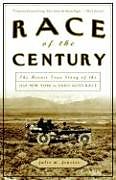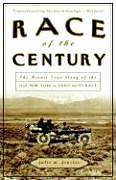Race of the Century
Einband:
Kartonierter Einband
EAN:
9780307339171
Untertitel:
The Heroic True Story of the 1908 New York to Paris Auto Race
Genre:
Sport
Autor:
Julie M. Fenster
Herausgeber:
Random House N.Y.
Anzahl Seiten:
400
Erscheinungsdatum:
01.10.2006
ISBN:
978-0-307-33917-1
Zusatztext "If America dreams driving! this is when the dreams began." Men's Health Fenster has saved an important part of the history of the automobile and adventure. All in all! it makes Race of the Century impossible to resist. Cleveland PlainDealer Fenster tells her story with zest and humor. American Heritage Fenster is a superb storyteller. Kirkus Reviews Informationen zum Autor Julie M. Fenster is an author and historian who began her career at Automobile Quarterly ! where her book Packard: The Pride won the Best Book award from the National Automotive Journalism Conference. She is also the author of the award-winning Ether Day and Parish Priest ! with coauthor Douglas Brinkley. Fenster lives in upstate New York. Chapter 1 The newsboys of New York could hardly wait for February 12 in 1908. It may have been just another Wednesday to some people, but not to the urchins and orphans who swarmed over the sidewalks every morning to hawk the World or the Sun , the Herald , the Tribune , or the Times , fanning out again in the afternoon to sell the Press , the Telegram , the Globe , Mail , and Evening World . In the days before broadcasting, the news of the world didn't move any faster than the sweaty little boys who carried itbut they didn't waste a second. They couldn't. A big city had a couple of dozen newspapers in 1908. And what is more, the leading papers issued four or five editions per day. It was a daily deluge that made newsboys run as fast as they could with each succeeding bundle of papers, getting rid of the old news just before the new news came along. When the day finally came to a close, New York City's orphan newsboys could look forward to decent surroundings at the Newsboys' Lodging House on Chambers Street in Lower Manhattan. On February 12 in 1908 about three hundred of them were also looking forward to a special feast for Lincoln's Birthday: turkey, cranberry sauce, celery, potatoes, turnips, pie, and coffee, all courtesy of a patron named Delano Weekes. Robert T. Lincoln, the son of the sixteenth president, was on the list of guests invited to share the newsboys' bounty. As a resident of Chicago, he'd already sent his regrets, though. So had another Union leader's sonone with a less convincing excuse. George B. McClellan, namesake of Lincoln's early favorite among Yankee generals, was the mayor of New York City in 1908. Bookish and a little vague under the best of circumstances, McClellan had a long list of appearances to make on Lincoln's Birthday, and he sent word in advance that Chambers Street wasn't among them. In the early morning, while the newsies were bleating for business and wondering just exactly what kind of pie they'd be having later on for dessert, the next round of headlines was sprouting all around them. In Brooklyn, a twenty-eight-year-old tailor from Italy lay dying; he had been shot five times by the mafia, which was surging to new heights of influence in 1908, dumbfounding even hardened Americans with its capacity for violence. The Black Hand wrote to me demanding money, the tailor was telling police early that morning from his deathbed, and I refused. Last night, they sent two men after me. They got me. He wasn't the only one in trouble. The organizers of the Grande Redoute Rosethe Pink Ballwere under siege from all of the women on the guest list who didn't happen to own a pink gown, and who couldn't get one in time for the February 14 dance. The committee spent the morning debating whether or not to allow white. No one in New York, however, or anywhere else, had a worse day than John J. Grant, a printer by trade. He swallowed poison, slit his wrists, and then jumped off the Brooklyn Bridgeand lived. ...
Klappentext
Capturing the determination and thrill of an era when technology made anything seem possible, this work tells the story of the death-defying New York-to-Paris Auto Race held in 1908. Photos.
Leseprobe
Chapter 1
The newsboys of New York could hardly wait for February 12 in 1908. It may have been just another Wednesday to some people, but not to the urchins and orphans who swarmed over the sidewalks every morning to hawk the World or the Sun, the Herald, the Tribune, or the Times, fanning out again in the afternoon to sell the Press, the Telegram, the Globe, Mail, and Evening World. In the days before broadcasting, the news of the world didn’t move any faster than the sweaty little boys who carried it—but they didn’t waste a second. They couldn’t. A big city had a couple of dozen newspapers in 1908. And what is more, the leading papers issued four or five editions per day. It was a daily deluge that made newsboys run as fast as they could with each succeeding bundle of papers, getting rid of the old news just before the new news came along.
When the day finally came to a close, New York City’s orphan newsboys could look forward to decent surroundings at the Newsboys’ Lodging House on Chambers Street in Lower Manhattan. On February 12 in 1908 about three hundred of them were also looking forward to a special feast for Lincoln’s Birthday: turkey, cranberry sauce, celery, potatoes, turnips, pie, and coffee, all courtesy of a patron named Delano Weekes.
Robert T. Lincoln, the son of the sixteenth president, was on the list of guests invited to share the newsboys’ bounty. As a resident of Chicago, he’d already sent his regrets, though. So had another Union leader’s son—one with a less convincing excuse. George B. McClellan, namesake of Lincoln’s early favorite among Yankee generals, was the mayor of New York City in 1908. Bookish and a little vague under the best of circumstances, McClellan had a long list of appearances to make on Lincoln’s Birthday, and he sent word in advance that Chambers Street wasn’t among them.
In the early morning, while the newsies were bleating for business and wondering just exactly what kind of pie they’d be having later on for dessert, the next round of headlines was sprouting all around them. In Brooklyn, a twenty-eight-year-old tailor from Italy lay dying; he had been shot five times by the mafia, which was surging to new heights of influence in 1908, dumbfounding even hardened Americans with its capacity for violence. “The Black Hand wrote to me demanding money,” the tailor was telling police early that morning from his deathbed, “and I refused. Last night, they sent two men after me. They got me.”
He wasn’t the only one in trouble. The organizers of the Grande Redoute Rose—the Pink Ball—were under siege from all of the women on the guest list who didn’t happen to own a pink gown, and who couldn’t get one in time for the February 14 dance. The committee spent the morning debating whether or not to allow white.
No one in New York, however, or anywhere else, had a worse day than John J. Grant, a printer by trade. He swallowed poison, slit his wrists, and then jumped off the Brooklyn Bridge—and lived. As soon as he was rescued, he was arrested.
Because schools, government offices, brokerages, and other businesses were closed for Lincoln’s Birthday, the stores were crowded right from the start. Macy’s celebrated its fiftieth anniversary by putting nearly everything on sale, selling eight-rib umbrellas for $5.00 each. Anyone who bought one could have brought it home in a bag, though; the morning was perfectly clear, with temperatures in the mid-thirties. Automobiles were also on sale in mid-February. “This is bargain time,” confided one agency in boldface type in the newspaper. Those who believed it could visit the showroom on Broadway north of Times Square, the same neighborhood in which most of New York’s car dealerships were lo…

Leider konnten wir für diesen Artikel keine Preise ermitteln ...
billigbuch.ch sucht jetzt für Sie die besten Angebote ...
Die aktuellen Verkaufspreise von 6 Onlineshops werden in Realtime abgefragt.
Sie können das gewünschte Produkt anschliessend direkt beim Anbieter Ihrer Wahl bestellen.
Loading...
Die aktuellen Verkaufspreise von 6 Onlineshops werden in Realtime abgefragt.
Sie können das gewünschte Produkt anschliessend direkt beim Anbieter Ihrer Wahl bestellen.
| # | Onlineshop | Preis CHF | Versand CHF | Total CHF | ||
|---|---|---|---|---|---|---|
| 1 | Seller | 0.00 | 0.00 | 0.00 |
